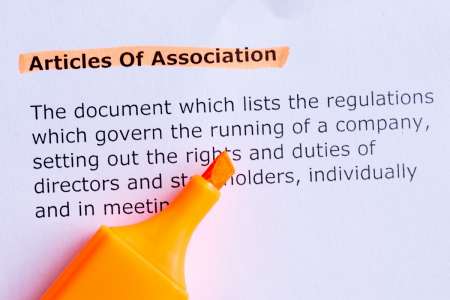
What is an entrenchment provision?
Under section 22 of the Companies Act 2006, members can entrench certain provisions in a company’s articles of association. This means that a higher threshold is set to amend, remove or alter a provision in the articles. Examples of entrenched provisions in a company’s articles include a provision that requires third-party consent to be amended or that requires a specific type or class of shareholder to approve.
Section 22 (2) of the Companies Act 2006 requires that a provision for entrenchment may only be made upon the formation of a company or if an amendment to the articles of a company is made by agreement of all its members. However, section 22 (2) is not yet in force and is currently under review, with an update said to follow in due course. This means that a provision for entrenchment can be created by a special resolution of members.
Ordinarily, most provisions in a company’s articles can be amended by a special resolution of the members. This resolution requires a majority of not less than 75% of the members to agree. Any clause in the articles that require more than a special resolution to pass is considered a provision for entrenchment.
Section 23 of the Companies Act 2006
Section 23 requires that a company notifies the Registrar of companies if it intends to include an entrenched provision on the formation (by marking box A9 on the Companies House form IN01). In addition, it is also a requirement to notify the Registrar when a company intends to either include or remove an entrenched provision within its existing articles (by way of Companies House form CC01 or Companies House form CC02, respectively). The rule applies to all UK-based companies, with or without entrenched provisions already in its articles of association.
Variation of class rights provisions
Every share class has specific rights that attach to it. The rights may relate to voting rights, dividend rights or rights relating to a return of capital should the company be wound up. Members can look to vary the class rights by approving a special resolution and filing the relevant form at Companies House.
The procedure to vary a class of rights is, in some cases, contained within a company’s articles of association and may require additional thresholds, meaning it is an entrenched provision. An example of an entrenched provision relating to variation of class rights is that members can provide for a variation of class rights to require the consent of 75% of the shareholders of the related class to approve. Therefore, on the surface, the provision could be considered an entrenched provision, as it requires a company’s members to satisfy a further requirement of procuring 75% of the share class holders to amend, alter or remove.
Effect of Section 22(3)(a) of the Companies Act 2006
Section 22(3)(a) provides a method of amending entrenched provisions in articles of association by unanimous consent of members, even if certain conditions need to be met. This means it is impossible to permanently entrench provisions in a company’s articles of association. It is important to ensure that the articles are drafted clearly and in a way that provides clarity when dealing with entrenched provisions to avoid any disagreement or dispute.





